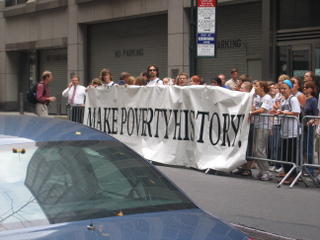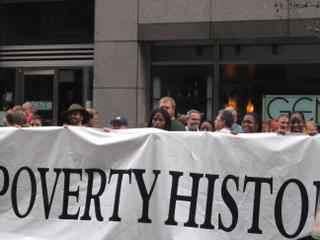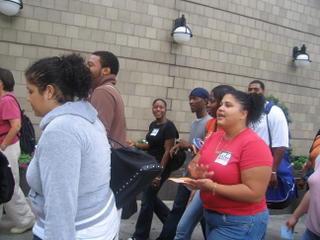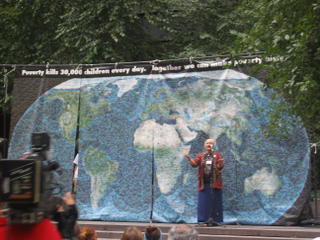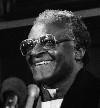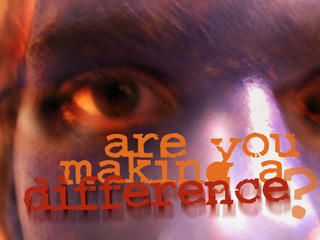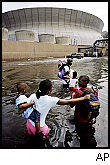September 8, 2005
Katrina's Silver Lining
By DAVID BROOKS
As a colleague of mine says, every crisis is an opportunity. And sure enough, Hurricane Katrina has given us an amazing chance to do something serious about urban poverty.
That's because Katrina was a natural disaster that interrupted a social disaster. It separated tens of thousands of poor people from the run-down, isolated neighborhoods in which they were trapped. It disrupted the patterns that have led one generation to follow another into poverty.
It has created as close to a blank slate as we get in human affairs, and given us a chance to rebuild a city that wasn't working. We need to be realistic about how much we can actually change human behavior, but it would be a double tragedy if we didn't take advantage of these unique circumstances to do something that could serve as a spur to antipoverty programs nationwide.
The first rule of the rebuilding effort should be: Nothing Like Before. Most of the ambitious and organized people abandoned the inner-city areas of New Orleans long ago, leaving neighborhoods where roughly three-quarters of the people were poor.
In those cultural zones, many people dropped out of high school, so it seemed normal to drop out of high school. Many teenage girls had babies, so it seemed normal to become a teenage mother. It was hard for men to get stable jobs, so it was not abnormal for them to commit crimes and hop from one relationship to another. Many people lacked marketable social skills, so it was hard for young people to learn these skills from parents, neighbors and peers.
If we just put up new buildings and allow the same people to move back into their old neighborhoods, then urban New Orleans will become just as rundown and dysfunctional as before.
That's why the second rule of rebuilding should be: Culturally Integrate. Culturally Integrate. Culturally Integrate. The only chance we have to break the cycle of poverty is to integrate people who lack middle-class skills into neighborhoods with people who possess these skills and who insist on certain standards of behavior.
The most famous example of cultural integration is the Gautreaux program, in which poor families from Chicago were given the chance to move into suburban middle-class areas. The adults in these families did only slightly better than the adults left behind, but the children in the relocated families did much better.
These kids suddenly found themselves surrounded by peers who expected to graduate from high school and go to college. After the shock of adapting to the more demanding suburban schools, they were more likely to go to college, too.
The Clinton administration built on Gautreaux by creating the Moving to Opportunity program, dispersing poor families to middle-class neighborhoods in five other metropolitan areas. This time the results weren't as striking, but were still generally positive. The relocated parents weren't more likely to have jobs or increase their earnings (being close to job opportunities is not enough - you need the skills and habits to get the jobs and do the work), but their children did better, especially the girls.
The lesson is that you can't expect miracles, but if you break up zones of concentrated poverty, you can see progress over time.
In the post-Katrina world, that means we ought to give people who don't want to move back to New Orleans the means to disperse into middle-class areas nationwide. (That's the kind of thing Houston is beginning to do right now.)
There may be local resistance to the new arrivals - in Baton Rouge there were three-hour lines at gun shops as locals armed themselves against the hurricane victims moving to their area - but if there has ever been a moment when people may open their hearts, this is it.
For New Orleans, the key will be luring middle-class families into the rebuilt city, making it so attractive to them that they will move in, even knowing that their blocks will include a certain number of poor people.
As people move in, the rebuilding effort could provide jobs for those able to work. Churches, the police, charter schools and social welfare agencies could be mobilized to weave the social networks vital to resurgent communities. The feds could increase earned-income tax credits so people who are working can rise out of poverty. Tax laws could encourage business development.
We can't win a grandiose war on poverty. But after the tragedy comes the opportunity. This is the post-Katrina moment. Let's not blow it.
 Since we have been discussing economics and policy in class, this book came my way while I was reading quite a disturbing article within the New York Times: http://www.nytimes.com/2005/09/30/politics/30cnd-bennet.html?hp
Since we have been discussing economics and policy in class, this book came my way while I was reading quite a disturbing article within the New York Times: http://www.nytimes.com/2005/09/30/politics/30cnd-bennet.html?hp